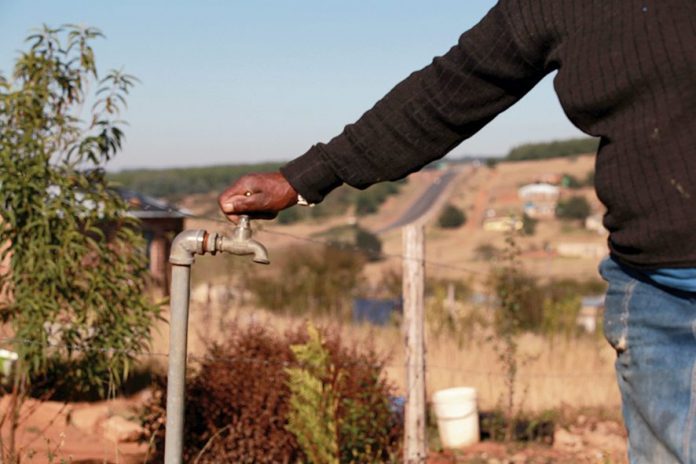When the alarm goes off at 6am, Mthokozisi Mfeka* prepares to gather his buckets and water containers in a wheelbarrow in order to be first in a long queue to receive water from JoJo tanks in Petsana, a township near Reitz in the Free State.
This has been a daily struggle since the residents moved into the new section of Petsana called Bergview.
However, the water supply challenges persist in most parts of the township.
Mfeka said the residents are never too sure how often water would be delivered in a day, and they sometimes leave buckets near the Jojo tanks to show who is next in the queue.
They wait patiently for the sound of a truck delivering water or just anyone calling them to come and get water.
Compared to weekdays, he said, weekends tend to have long queues, as everyone desperately needs water to wash their clothes and clean their homes.
Taps run dry
“We were promised service delivery when we came this side, but now we even struggle for water. Mind you, this is not just happening in the new section. Older parts of Petsana have dry taps as well and it has been a while now,” said Mfeka.
Another resident Tumelo Monyatsi said he has spent at least six months without tap water. His neighbours were also affected, resulting in them to depend on the JoJo tanks.
The water supply challenges have been reported to the Nketoana local municipality but no improvement has been noticed.
“This is rather painful for the community because there is also a communal tap for the new section nearby, but if there is no water coming out from our taps, we know that the communal tap is also dry,” said Monyatsi.
“You can imagine homes where everyone is working or attending school. They either have to wake up very early to get water or go at peak hours in the afternoon to get water. This is a basic need that we all struggle for in Petsana.”
DA councilor Thinus Blignaut told Sunday World this week that the municipality has been ignoring cost-effective suggestions to install communal taps, which will get water supply from the town’s existing reservoir.
He said this is a better solution to the problem instead of spending R99 015 a month on water delivery trucks. A quarterly report shows that the municipality paid R198 029 for water delivery services in two months.
Installing communal taps, said Blignaut, would be a once-off expense that would cut monthly costs of basic service delivery and avoid excessive spending by the municipality.
[irp posts=”306730″ ]“The unchecked squandering of public funds on inefficient water supply methods directly impacts residents of Petsana,” he said.
“The current situation not only imposes an unnecessary financial burden on the community but also jeopardises the reliability of their water supply.
“By transitioning to a more cost-effective and stable solution, we aim to alleviate the financial strain on the residents and guarantee a consistent and secure water source.”
Cost-effective communal taps
The DA has urged the municipality to review the contract it has with the water supplier and engage with stakeholders to implement suggested cost-effective communal taps.
Blignaut said some residents would travel for long distances to neighbouring communities and older parts of Petsana to get water.
“We are committed to rectifying this ongoing trend of financial mismanagement by the municipality,” he said.
“Despite our persistent and cost-effective recommendations, the wasteful expenditure continues unabated, contradicting the DA’s steadfast commitment on prudence.”
He added that a three-year contract with the water supplier needed to be settled for the benefit of the municipality and the community.



